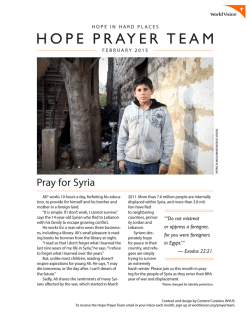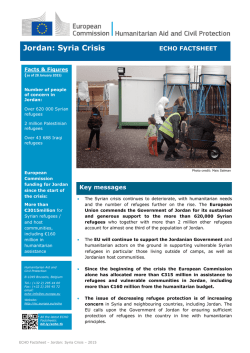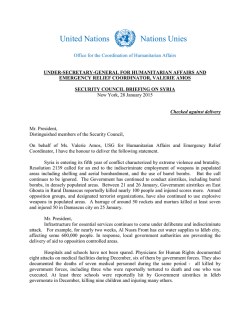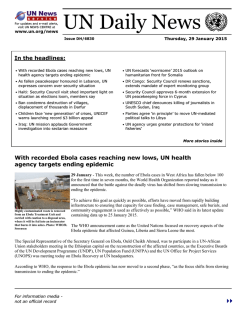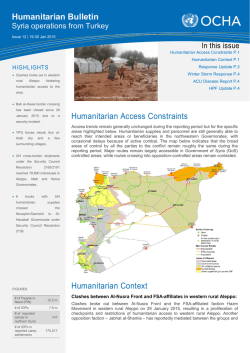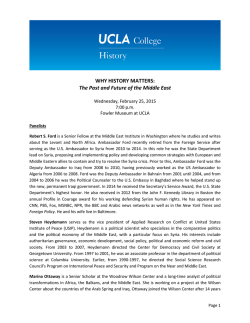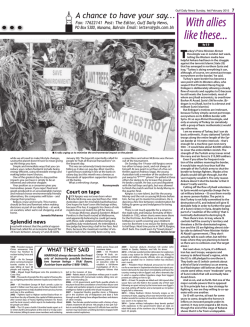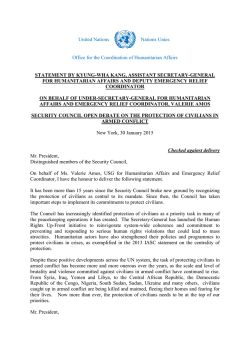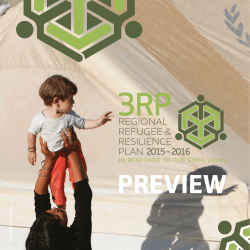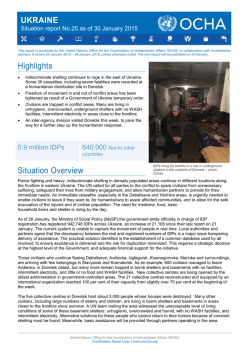
EU steps up humanitarian assistance to Syria crisis
European Commission - Press release EU steps up humanitarian assistance to Syria crisis Brussels, 29 January 2015 With the humanitarian situation worsening every day, growing numbers of people inside Syria and refugees in neighbouring countries are in need of assistance. The European Union is increasing its assistance to the Syria crisis by €136 million in humanitarian funding, half of which will go to needs inside Syria, and the other half to Syrian refugees and host communities in neighbouring Turkey, Lebanon, Jordan and Iraq. The funding was announced as Commissioner for Humanitarian Aid and Crisis Management Christos Stylianides, and Commissioner for European Neighbourhood Policy and Enlargement Negotiations Johannes Hahn, are in Lebanon and Jordan on a joint visit to discuss the growing needs of Syrian refugees and the growing burden on neighbouring countries. "Alleviating the suffering of the victims of the Syrian crisis has been my top priority from day one of my mandate,” said Commissioner Christos Stylianides. “I see with my own eyes the difficulties refugees face having fled from the conflict to neighbouring countries. Europe's solidarity is unwavering and we remain fully committed to continue bringing relief to the most needy victims of this crisis - that is why we are stepping up our assistance,” the Commissioner explained. “Let me express my deep appreciation for the immense efforts by Lebanon and Jordan, who have shown huge solidarity with the refugees in their greatest time of need". Commissioner Hahn added"The EU will keep standing by the Syrian people and by the communities in Lebanon and Jordan hosting them who need all the help they can get in this terrible crisis. In addition to the humanitarian assistance announced today, I would like to reiterate EU’s continued commitment to support Lebanon and Jordan in their efforts to deal with the increasing flow of refugeesfrom Syria and ensuring access to essential services such as health and education." He also stated:"In addition to our efforts addressing the consequences of the Syrian crisis, the EU remains fully committed to bilateral cooperation with Jordan and Lebanon and will continue to work closely with both governments to support them in their on-going reforms in key sectors, such as renewable energy or justice.” This new humanitarian funding from the European Commission will help people displaced within Syria, as well as refugees in neighbouring countries living both outside and inside campsto ensure that those most in need can obtain shelters, livelihood and a dignified life despite the current very harsh circumstances. The additional money will support humanitarian partners to deliver assistance such as food aid, emergency medical supplies, clean water, shelter needs, and cash assistance, among others. Background The European Union, with its Member States, is one of the leaders of the international humanitarian response to the Syria crisis, having mobilised over €3.25 billion in assistance. Including today's top-up, the European Commission alone has provided €817 million in humanitarian funding. Of this new humanitarian funding half will go to needs inside Syria, and the other half to neighbouring countries hosting Syrian refugees. This includes €37 million to Lebanon and €20 million to Jordan in 2015. The EU humanitarian assistance channelled through the European Commission's Humanitarian Aid and Civil Protection Directorate (ECHO) primarily supports life-saving medical emergency responses, the provision of essential drugs, food and nutritional items, safe water, sanitation and hygiene (WASH), shelter, distribution of basic non-food items (NFIs) and protection to help the most vulnerable families (Internally Displaced People, refugees, host communities). Substantial support has been also provided to address the consequence of the Syrian crisis through the European Neighbourhood Instrument, including €250 million in Lebanon and €160 million in Jordan since the start of the crisis. This assistance supports the national and local capacities to deliver services for those affected by the crisis (education, health, basic services such as water and waste management services, support to livelihoods, etc.) This support comes in addition to the standard bilateral cooperation with Jordan (€110 million in 2014) and Lebanon (€67 million in 2014) through the European Neighbourhood Instrument. EU bilateral cooperation with Jordan and Lebanon is tackling a broad range of sectors, ranging from public finance management, reform of the justice sector, technical and vocational education and training to the promotion of sustainable and transparent management of energy and natural resources. For more information Syria factsheet: http://ec.europa.eu/echo/files/aid/countries/factsheets/syria_en.pdf#view=fit EU development cooperation – Syrian crisis: http://ec.europa.eu/enlargement/neighbourhood/countries/syria/index_en.htm EU development cooperation with Jordan: http://ec.europa.eu/enlargement/neighbourhood/countries/jordan/index_en.htm EU development cooperation with Lebanon: http://ec.europa.eu/enlargement/neighbourhood/countries/lebanon/index_en.htm IP/15/3883 Press contacts Maja KOCIJANCIC (+32 2 298 65 70) Irina NOVAKOVA (+ 32 2 295 75 17) Catherine RAY (+32 2 296 99 21) Anca PADURARU (+ 32 2 296 64 30) General public inquiries: Europe Direct by phone 00 800 67 89 10 11 or by email
© Copyright 2026
